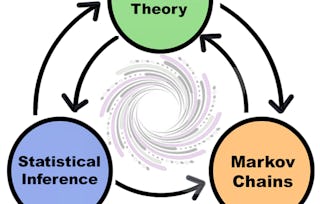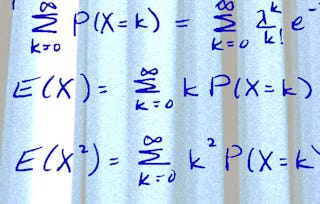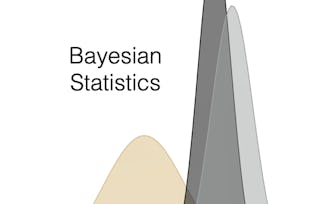Understand the foundations of probability and its relationship to statistics and data science. We’ll learn what it means to calculate a probability, independent and dependent outcomes, and conditional events. We’ll study discrete and continuous random variables and see how this fits with data collection. We’ll end the course with Gaussian (normal) random variables and the Central Limit Theorem and understand its fundamental importance for all of statistics and data science.

Probability Foundations for Data Science and AI

Probability Foundations for Data Science and AI
This course is part of multiple programs.


Instructors: Anne Dougherty
37,474 already enrolled
Included with
280 reviews
Recommended experience
What you'll learn
Explain why probability is important to statistics and data science.
See the relationship between conditional and independent events in a statistical experiment.
Calculate the expectation and variance of several random variables and develop some intuition.
Skills you'll gain
Details to know

Add to your LinkedIn profile
7 assignments
See how employees at top companies are mastering in-demand skills

Build your subject-matter expertise
- Learn new concepts from industry experts
- Gain a foundational understanding of a subject or tool
- Develop job-relevant skills with hands-on projects
- Earn a shareable career certificate

There are 6 modules in this course
Understand the foundation of probability and its relationship to statistics and data science. We’ll learn what it means to calculate a probability, independent and dependent outcomes, and conditional events. We’ll study discrete and continuous random variables and see how this fits with data collection. We’ll end the course with Gaussian (normal) random variables and the Central Limit Theorem and understand it’s fundamental importance for all of statistics and data science.
What's included
3 videos5 readings2 assignments1 programming assignment2 ungraded labs
The notion of “conditional probability” is a very useful concept from Probability Theory and in this module we introduce the idea of “conditioning” and Bayes’ Formula. The fundamental concept of “independent event” then naturally arises from the notion of conditioning. Conditional and independent events are fundamental concepts in understanding statistical results.
What's included
2 videos1 reading1 assignment1 programming assignment1 ungraded lab
The concept of a “random variable” (r.v.) is fundamental and often used in statistics. In this module we’ll study various named discrete random variables. We’ll learn some of their properties and why they are important. We’ll also calculate the expectation and variance for these random variables.
What's included
4 videos1 reading1 assignment1 programming assignment1 ungraded lab
In this module, we’ll extend our definition of random variables to include continuous random variables. The concepts in this unit are crucial since a substantial portion of statistics deals with the analysis of continuous random variables. We’ll begin with uniform and exponential random variables and then study Gaussian, or normal, random variables.
What's included
4 videos2 readings1 assignment1 programming assignment1 ungraded lab
The power of statistics lies in being able to study the outcomes and effects of multiple random variables (i.e. sometimes referred to as “data”). Thus, in this module, we’ll learn about the concept of “joint distribution” which allows us to generalize probability theory to the multivariate case.
What's included
3 videos1 reading1 assignment1 programming assignment
The Central Limit Theorem (CLT) is a crucial result used in the analysis of data. In this module, we’ll introduce the CLT and it’s applications such as characterizing the distribution of the mean of a large data set. This will set the stage for the next course.
What's included
2 videos1 reading1 assignment1 programming assignment1 ungraded lab
Earn a career certificate
Add this credential to your LinkedIn profile, resume, or CV. Share it on social media and in your performance review.
Build toward a degree
This course is part of the following degree program(s) offered by University of Colorado Boulder. If you are admitted and enroll, your completed coursework may count toward your degree learning and your progress can transfer with you.¹
Instructors


Offered by
Explore more from Probability and Statistics
 Status: Free Trial
Status: Free TrialUniversity of Colorado Boulder
 Status: Free Trial
Status: Free TrialJohns Hopkins University
 Status: Free Trial
Status: Free TrialUniversity of Colorado Boulder

University of Colorado Boulder
Why people choose Coursera for their career

Felipe M.

Jennifer J.

Larry W.

Chaitanya A.
Learner reviews
- 5 stars
77.85%
- 4 stars
10.35%
- 3 stars
3.21%
- 2 stars
1.78%
- 1 star
6.78%
Showing 3 of 280
Reviewed on Oct 18, 2024
Thanks for this course to provide crucial information about Probabilities!
Reviewed on Jun 2, 2024
Thank you to everyone who put a lot of effort into making this course; it is really helpful.
Reviewed on Apr 17, 2022
Need to brush up integral calculus for thios course. Something I haven't looked at for 40 years.

Open new doors with Coursera Plus
Unlimited access to 10,000+ world-class courses, hands-on projects, and job-ready certificate programs - all included in your subscription
Advance your career with an online degree
Earn a degree from world-class universities - 100% online
Join over 3,400 global companies that choose Coursera for Business
Upskill your employees to excel in the digital economy
Frequently asked questions
To access the course materials, assignments and to earn a Certificate, you will need to purchase the Certificate experience when you enroll in a course. You can try a Free Trial instead, or apply for Financial Aid. The course may offer 'Full Course, No Certificate' instead. This option lets you see all course materials, submit required assessments, and get a final grade. This also means that you will not be able to purchase a Certificate experience.
When you enroll in the course, you get access to all of the courses in the Specialization, and you earn a certificate when you complete the work. Your electronic Certificate will be added to your Accomplishments page - from there, you can print your Certificate or add it to your LinkedIn profile.
Yes. In select learning programs, you can apply for financial aid or a scholarship if you can’t afford the enrollment fee. If fin aid or scholarship is available for your learning program selection, you’ll find a link to apply on the description page.
More questions
Financial aid available,

